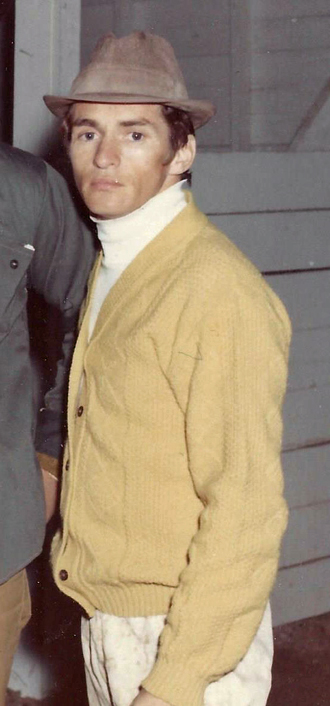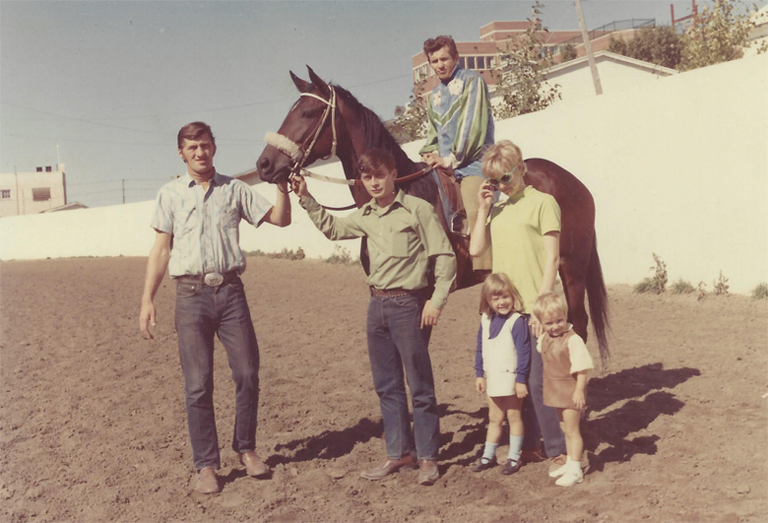
by Bob Gates
Some and perhaps most of you will consider this week’s blog story choice a little obscure. Others will look at the title and wonder, Rupert who?
Rupert Parker was a jockey who plied his trade at Assiniboia Downs from the mid 1960s to the mid to late 1970s. He wasn’t the most talented jock nor the most successful, but he was a colourful character and an able rider.
As jockeys go, there will always be the cream of the crop and those who probably should have considered another calling. In between however, lays a huge population of average, hard-working, journeymen riders whose stories deserve to be told.
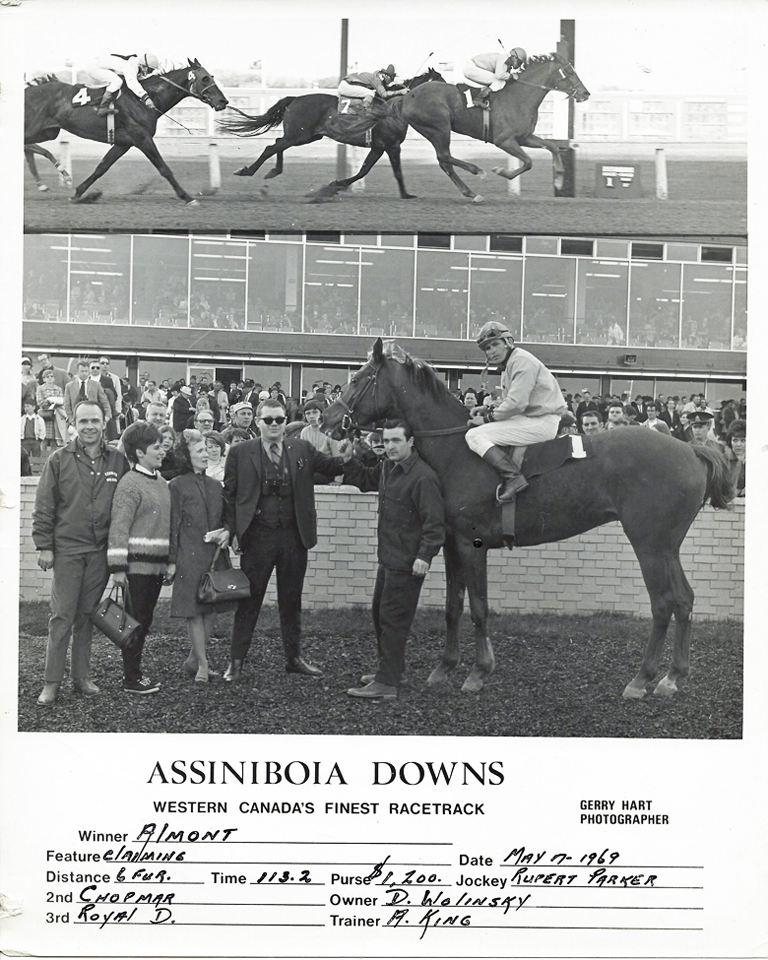
There is no official count, but I imagine there have been hundreds and hundreds, perhaps even thousands of saddlesmiths who have graced the jockeys’ quarters, or as it is commonly known, the “Room” located in the lower level at the north end of the grandstand since the Downs opened in 1958.
This week we look at this group of vertically challenged riders, but you couldn’t possibly write about them all. So I have chosen one to represent the many men and women who deal with more workplace hazards on a single card of racing than the rest of us will face in our collective lifetimes.
My choice to represent this group is Rupert “Chicago” Parker, whose career predates the statistical horse racing giant Equibase, so I can’t provide any definitive stats. I can tell you he never rode a Manitoba Derby winner and he never won a riding title at the Downs or anywhere else for that matter.
But in many ways, Parker typifies the kind of rider who worked hard to earn a living in a sport where he and others are routinely asked to put their life at risk every time they get a leg up on a 1,000 plus pounds of speeding muscular flesh and bone.
Parker was a decent enough jockey, and a very adept gallop boy with a great set of hands. He galloped the tough ones. If you had an ornery cuss of a thoroughbred, Parker was your man. He learned early never to fight with his mounts. Despite of what you might think, you’re not going to force a racehorse to do anything it really doesn’t want to.
Parker loved to sing and he sang all the time, anywhere and everywhere. He had a signature quirk that drove his fellow jockeys nuts. He was famous for serenading his horses in the starting gate. It calmed the four-legged juggernauts, who not only loved it, but grew use to the ritual.
Parker had a great sense of humour and was the kind of guy that you either loved or hated — there was no middle ground. Parker didn’t have a reputation for being the most successful rider in the irons, but he was the best cribbage player in the Room. Rumour has it he scored a perfect “29” hand in a game with a young Dr. Joe Meek.
In the mid 1960s Parker would go from farm to farm galloping horses in the morning working for men like Tommy Elias, Harold Bieber, John Cizik and Ralph Kennedy.
Truth be told, I selected Parker to write about because he rode my all-time favourite horse to her first ever victory here at Assiniboia Downs, Max Freed’s Spanish Key. Freed’s beauty was arguably one of the fastest mares ever to race at the Downs. According to Carl Anderson, who trained the mare in 1969, she excelled at the first jump away from the gate. She was a nice mare but had a tendency to run off on everyone, but Parker had a way with her.
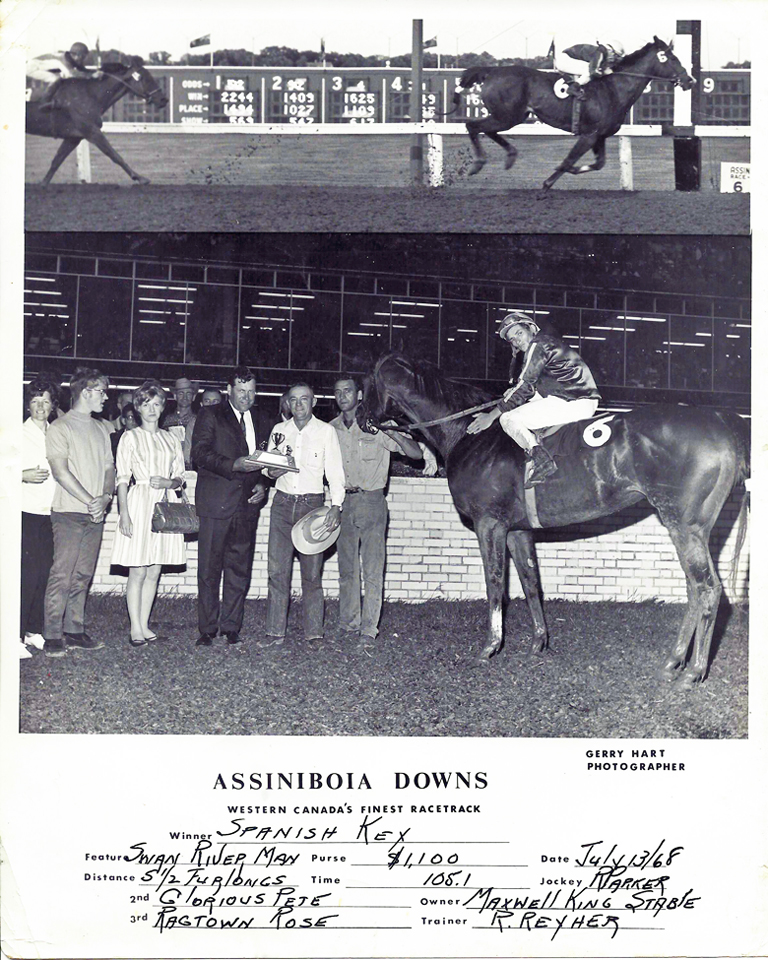
Parker galloped some very good horses down east for the Beasley family. He was a regular rider in the morning for He’s a Smoothie – Canadian Horse of the Year in 1967 who was elected to the Canadian Horse Racing Hall of Fame in 2003. He also rode another Beasley champion, Jumpin Joseph, who was 1969’s Queen’s Plate winner and the Canadian Horse of the Year in 1969. Parker new all to well what a good horse felt like, he just never got a real good chance to be a regular rider for one of the true bluebloods.
In Regina, on September 5, 1970, Parker won on a horse called Dief, but the inquiry sign went up. He was so sure his number was going to come down he threw his saddle to the ground in disgust and stormed off. His anger proved premature and the results stood as posted, but Parker was nowhere to be found, so the traditional win picture wasn’t taken. The following day, trainer Bob Hartley got together with the whole Parker family and took his own “win” photo with Dief. What a great photo-op!
I’m still on the fence as to whether jockeys are the bravest or craziest human beings on the planet or some fragile balance of the two. According to one track physician, “pound for pound, they are the toughest and strongest people in all sports.” The same Doc said riding was a questionable career choice, and that not much had changed for riders in the last 100 years. Yet, they ride and they dream. On the subject of a jockey’s weight he used phrases like “government-mandated malnutrition” and “state-sanctioned starvation.”
If you think the dangers of the profession are exaggerated, consider the comments of ESPN writer Tim Keown, who said “horse racing, reduced to its core element is a series of organized stampedes in which jocks are asked to impose order upon chaos.”
Parker thought the world of Downs’ all-time leading jockey Ken Hendricks. Recently, I spoke with Hendricks and asked if he remembered Parker. The very mention of Parker’s name got “Hank” laughing. When he calmed down he described Parker as a carefree guy who was always goofing around. Hendricks said he liked him and that Parker was never very serious about anything.
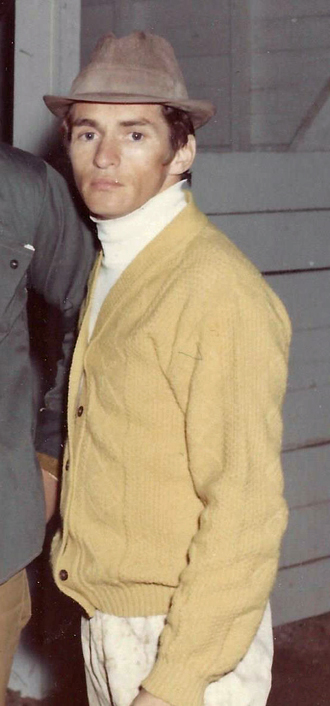
I’m sure there were more things that Parker would have liked to accomplish on the race track, but for him it was all about the horses. At the end of the day, Rupert Parker loved horses.
For those of you who may not know, Rupert Parker was once married to our own Connie Clauson, who would be the first to tell you that in the early years they lived life hard, but it was different time back then. It was a challenging time for the young married couple, whose union fell victim to the trappings of a difficult lifestyle. Their marriage may not have stood the test of time, but their crowning achievement was the two children they brought into the world, Russ and Lavona.
The Parkers’ split was amicable. They remained good friends and always respected each other. Rupert was a fun-loving character and according to Connie the kindest man she ever met. I wonder how many ex-wives would say something like that following a marriage break-up. He even galloped Connie’s horses right up to the time of his death. In April 1996, throat cancer robbed Russ and Lavona of more time with their Dad, a man they thought the world of and deeply respected.
Make no mistake about it, Rupert Parker was no saint. He loved to gamble. He was a happy-go-lucky, good-time Charley who loved hats, a good stogie and had an avid appreciation for wagering on any game of chance.
Rupert “Chicago” Parker loved horses, he was a great Dad to Russ and Lavona, and doesn’t it say something when your ex-wife bears no malice and still speaks highly of you.
Connie was the best bet he ever made. And he always knew it.

